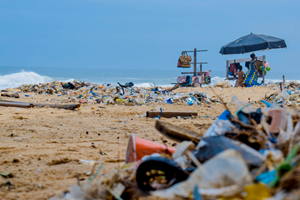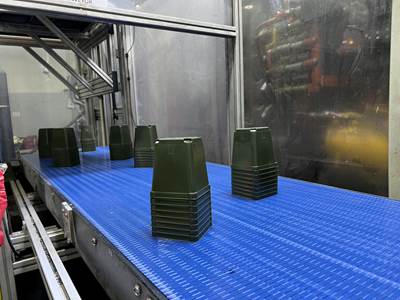DOMO, Covestro and Circularise Partner on Full Plastics Traceability
Innovative start-up Circularise says transparency can be achieved through a blockchain technology.
The Netherlands’s nylon producer DOMO Chemicals (U.S. office in Buford, Ga.); Covestro, Pittsburgh; and The Netherlands’ Circularise, an innovative transparency start-up, have announced a new collaborative project for circularity in the plastics industry through the use of blockchain technology. The newly formed Circularise PLASTICS project group aims to set up an open standard for sustainability and transparency within this field. At K 2019, Both DOMO and Covestro plan to discuss the project with customers and to look for new partners to join them on this pathway towards full circularity.
Says DOMO CEO Alex Segers, “Registries and tracking systems are key to assessing progress towards global circularity goals. Blockchain can bring transparency where it's most needed, especially when it comes to supply chain traceability in our industry. Achieving a single standard for traceability to origin would enable the industry to respond and communicate regarding sustainability practices and attach proof of origin to materials.”
The partners believe that achieving traceability and transparency in the plastics supply chain enabled by blockchain will make it more authentic and transparent. There are three main objectives:
- Choose Circular: Make it easier for suppliers, processors, manufacturers, molders and brand owners to choose traceable, sustainable and circular materials.
- Produce Circular: Create incentives for suppliers and manufacturers to produce traceable, sustainable and circular materials and products.
- Make Circular: Provide critical information for reversed logistics and take back of products, materials and components.
The compatibility of blockchains has been a hot topic, including in the plastics space, where the benefits of this new technology can serve all parts of the supply chain. “For material suppliers & processors, as well as equipment and moldmakers, Circularise plastics participation means increased material value and trust in your production, by adding material passports to plastic resin, additives, colorants and any other materials produced. For OEMs & brand owners, it helps on the road to achieving sustainability targets and a strengthened brand position, by revealing a product’s origin and transparency on its environmental impact,” says Burkhard Zimmermann, head of strategy, sustainability and digital at Covestros Polycarbonates segment.
The value of blockchain is that it avoids the use of a powerful central authority and thereby gives equal rights to all participants. Tech innovator Circularise is making transparency and communication in global value chains possible by utilizing blockchain and zero-knowledge proof. Their protocol enables trusted data exchange in fragmented supply chains without public disclosure of datasets or supply chain partners. Unlike other blockchain transparency solutions, Circularise’s technology called “smart questioning” protects a company’s privacy and sensitive information.
This means that confidentiality and competitive advantage are always maintained. The technology also eliminates the need to trust a centralized party. “Because all of the verification is done by the system itself, the idea is that users do not need to rely on a central point of control. Instead, trust is transferred from one centralized authority (such as a verifying party) to many decentralized, anonymous participants,” says Mesbah Sabur at Circularise.
The Circularise PLASTICS concept involves a seven-step process whereby the source material can be followed through a blockchain pathway, ensuring end-to-end product traceability and provenance. If ultimately accepted by the original information holder (plastic producer/molder), the OEM can access important information and make statements accordingly. This solution has two basic main advantages over other initiatives. The open protocol will enable an industry standard (on any blockchain) and avoid monopoly. The Smart Questioning technology safeguards privacy, while still allowing for transparency.
The Circularise PLASTICS project is still at a very early stage and the objective at K 2019 is to raise interest among value chain partners, that are willing to join the consortium in the ideation and testing phase. New members will become sustainability innovators in the plastics industry. This will give them access to the latest information and resources, and present the opportunity to co-create an industry-wide communication standard for a circular economy.
Related Content
Honda Now Exploring UBQ’s Biobased Material Made from Unsorted Household Waste
UBQ is aiming to expand its reach for more sustainable automotive parts as well as non-automotive applications.
Read MoreResins & Additives for Sustainability in Vehicles, Electronics, Packaging & Medical
Material suppliers have been stepping up with resins and additives for the ‘circular economy,’ ranging from mechanically or chemically recycled to biobased content.
Read MoreThermoforming PCR: An Equipment Supplier’s Pointers
Thermoforming PCR is not radically different from forming virgin, but variation in recycled materials can require extra care to get a consistent end result. Start by examining every aspect of the process from the sheet (and extrusion process if run inline) to the final trim.
Read MoreFungi Makes Meal of Polypropylene
University of Sydney researchers identify two strains of fungi that can biodegrade hard to recycle plastics like PP.
Read MoreRead Next
Processor Turns to AI to Help Keep Machines Humming
At captive processor McConkey, a new generation of artificial intelligence models, highlighted by ChatGPT, is helping it wade through the shortage of skilled labor and keep its production lines churning out good parts.
Read MorePeople 4.0 – How to Get Buy-In from Your Staff for Industry 4.0 Systems
Implementing a production monitoring system as the foundation of a ‘smart factory’ is about integrating people with new technology as much as it is about integrating machines and computers. Here are tips from a company that has gone through the process.
Read More
























